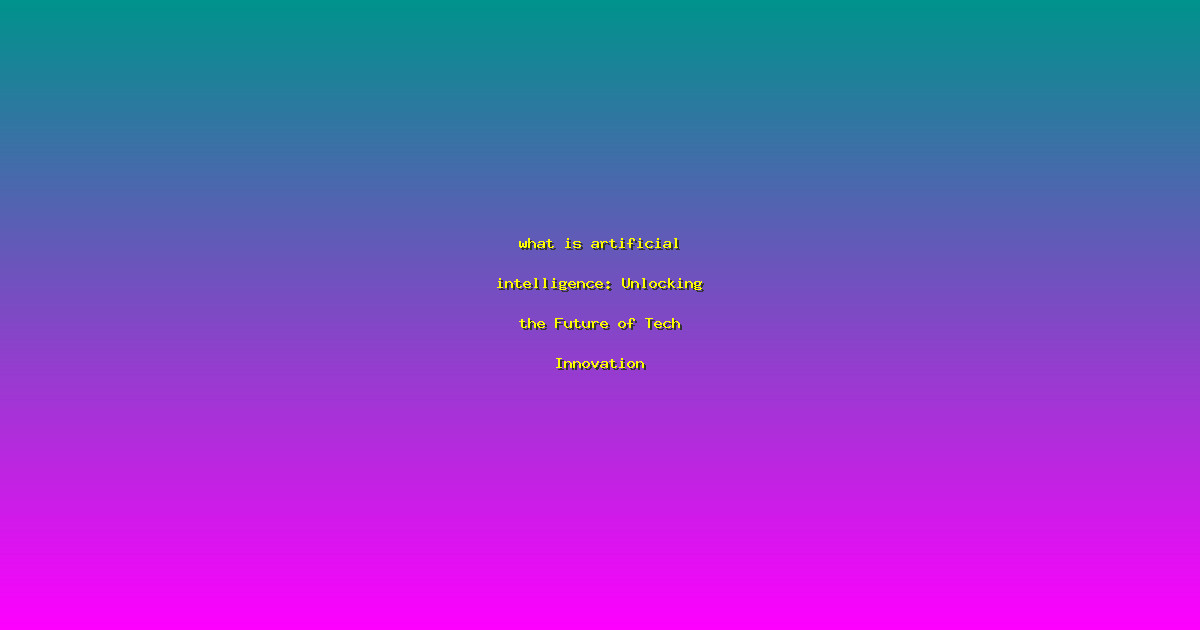What is Artificial Intelligence: Unlocking the Future of Tech Innovation
Artificial intelligence (AI) has become one of the most transformative forces in the world today, permeating every aspect of our lives, from healthcare to entertainment. AI, in its essence, refers to the simulation of human intelligence processes by machines, especially computer systems. These processes include learning (the acquisition of information and rules for using the information), reasoning (using the rules to reach approximate or definite conclusions), and self-correction. AI can be applied to a wide range of tasks such as recognizing patterns in data, predicting outcomes, and making decisions.
The Evolution and Impact of AI
The journey of AI dates back to the 1950s, but it wasn't until the last decade that significant breakthroughs have propelled AI into the mainstream. Today, AI is not just confined to academic research but is deeply embedded in everyday applications that we use without even realizing it. From virtual assistants like Siri and Alexa, to recommendation systems on Netflix and Spotify, AI is revolutionizing the way we interact with technology and each other.
Understanding AI: The Types and Applications
AI can be categorized into two broad types: narrow or weak AI, which is designed to perform a narrow task (like facial recognition or internet searches), and general or strong AI, which can understand, learn, and apply its intelligence to any task, much like a human. The applications of AI are vast and varied. In healthcare, AI is being used to diagnose diseases more accurately and quickly. In finance, AI algorithms are used to identify fraudulent transactions. In manufacturing, AI optimizes production processes, and in autonomous vehicles, AI makes decisions in real-time for safer driving.
The Ethical Considerations of AI
As AI continues to evolve, it brings with it a host of ethical considerations. Issues such as privacy, bias, and the potential for job displacement are at the forefront of discussions about AI. Ensuring that AI systems are developed and used responsibly is crucial to realizing the benefits of this technology while mitigating its risks.
Frequently Asked Questions
Q: What is machine learning?
Machine learning is a subset of AI that involves building systems that can learn from and make decisions based on data. It automates model building for analyzing data, allowing computers to learn from examples and data, rather than through explicit programming.
Q: Can AI replace human jobs?
While AI can automate certain tasks, it is more likely to change the nature of work rather than replace humans entirely. Many jobs will be redefined, and new types of jobs may emerge as a result of AI. However, it's crucial to address the concerns of job displacement through retraining and education.
Q: Is AI safe?
Safety in AI is a critical area of research and development. Ensuring that AI systems operate safely and ethically is paramount. This involves rigorous testing, transparency, and accountability in how these systems are designed and deployed.
Q: How does AI impact privacy?
AI can both enhance privacy through better data protection measures and pose challenges, particularly in areas like facial recognition and data collection. Transparency in how data is used and robust privacy laws are essential to mitigate these concerns.
Q: What is the future of AI?
The future of AI holds the potential for significant advancements in fields such as healthcare, transportation, and environmental science. However, it is also important to ensure that the development of AI is guided by ethical principles to benefit society as a whole.
Conclusion
Artificial intelligence is not just a buzzword but a transformative technology that promises to reshape our world. As AI continues to evolve, it is essential that we not only embrace its potential to solve complex problems but also address the ethical, legal, and societal challenges that come with it. By doing so, we can ensure that AI serves as a force for good, enhancing our lives and driving innovation in ways that were once only possible in the realm of science fiction.
Stay curious about AI and its implications on our future. Discover more about AI developments and their impact on society.

